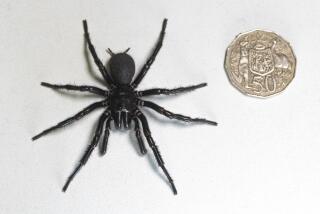Female cave bug sports ‘penis-like’ sexual organ, study says
Talk about clingy! A newly discovered cave insect can copulate for up to 70 hours, possibly because the female has a “penis-like” sexual organ that penetrates deeply into her male partner, anchoring him for the duration, scientists say.
In a paper published recently in the journal Current Biology, researchers described the exotic sexual characteristics of Neotrogla, a genus of winged insects that inhabit guano-speckled Brazilian caves.
Though a dizzying array of courtship and mating behaviors have been observed among insects, study authors say Neotrogla is unique.
The female possesses a “highly elaborate penis-like structure, the gynosome,” wrote lead author Kazunori Yoshizawa, an entomologist at Hokkaido University in Japan.
This external, or intromittent, sexual organ is curved, spiky and inflatable, Yoshizawa and his colleagues wrote. During copulation, the female mounts the male insect, which itself lacks an intromittent organ. Instead, the male is equipped with a “simple” opening that exposes its seminal duct.
Once sex begins, it typically lasts between 40 and 70 hours, researchers said. The female holds the male so tightly from the inside that when scientists tried to pull one couple apart, the male insect was ripped in half “without breaking the genital coupling.”
So why the gender-bending switcheroo?
Scientists speculate that it has to do with the bugs’ rather barren surroundings. The caves they populate are extremely dry, and the insect’s primary food sources are dead bats and bat dung, which are relatively scarce.
Mating males produce “voluminous” spermatophores, capsules of sperm and nutritious compounds. Competition among females for a male’s “nutritious gifts” may have caused them to develop gynosomes, authors wrote.
“This organ may have a premating function grasping reluctant mates or a postmating function holding mates to ensure prolonged copulation, although these functions are not mutually exclusive,” the authors wrote.







